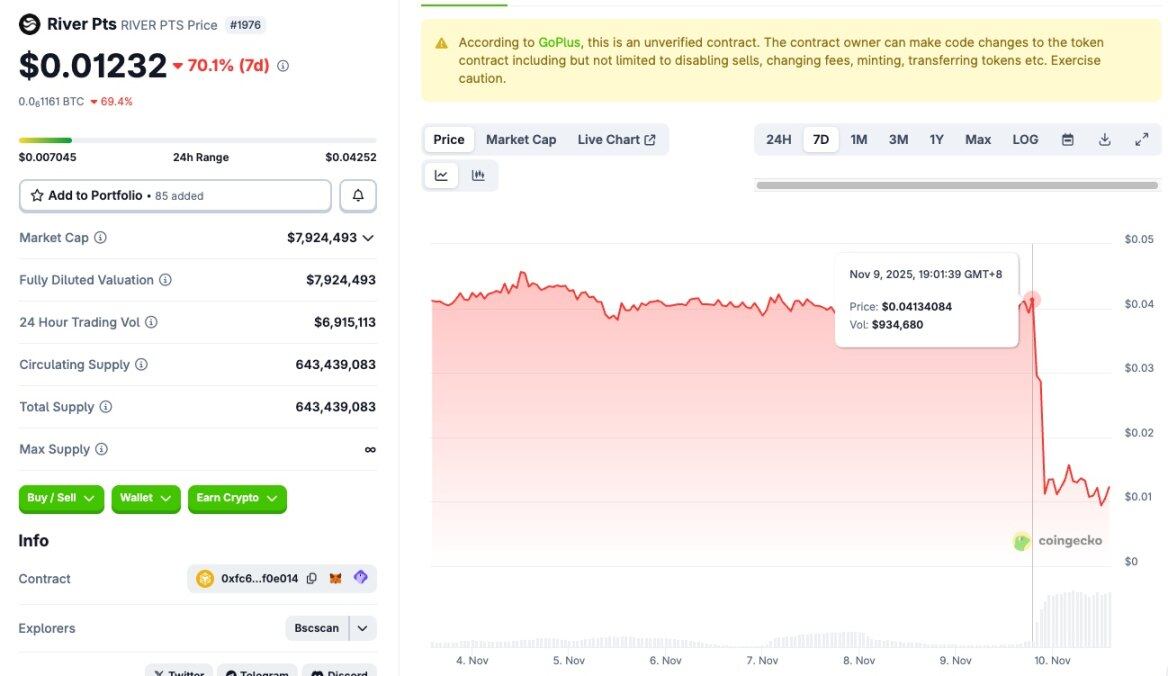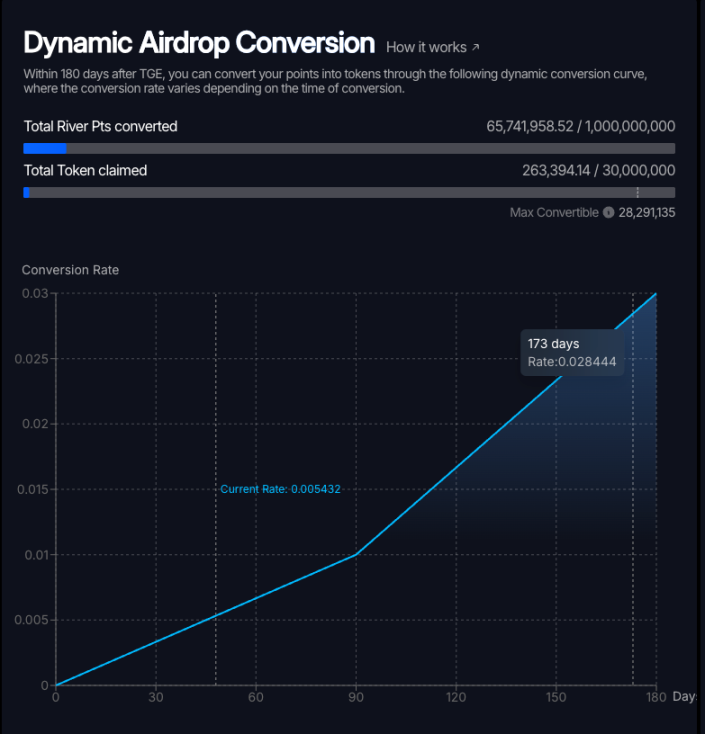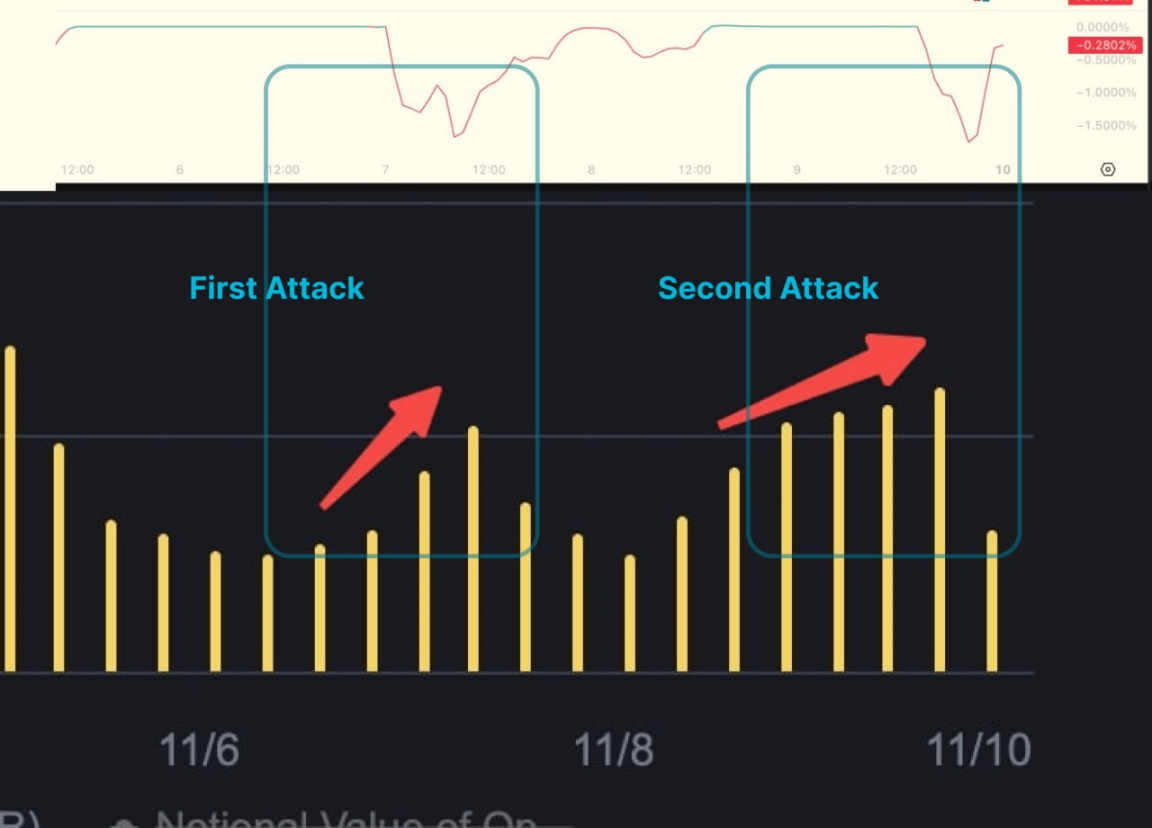Original Author: ChandlerZ, Foresight News
On the evening of November 9, the chain abstract stablecoin system River announced that it would temporarily suspend the mechanism for exchanging River Pts for RIVER tokens and plans to undergo a comprehensive upgrade. The official reason given was that the price of RIVER had recently faced organized and premeditated short-selling attacks, with some large holders concentrating on exchanging River Pts for RIVER in a short period, combined with large short positions, to collaboratively suppress the market price.
River Pts are ecological points of River, which can be traded and staked as ERC20 tokens; under River's unique Dynamic Airdrop Conversion mechanism, River Pts can be converted into RIVER tokens at any time within 180 days, allowing users to choose the timing based on market behavior.
After the announcement, River Pts plummeted in the secondary market. Market data showed that River Pts fell from about $0.04 to around $0.01 on the same day, with a single-day decline of over 70%, as selling pressure surged.

What is River? And what is Dynamic Airdrop Conversion?
The River project is developed by the RiverdotInc team, with its core positioning as a chain abstract stablecoin system for multi-chain ecosystems. This system aims to connect assets, liquidity, and yields across different blockchains, enabling seamless cross-chain interactions without relying on traditional bridging or wrapping mechanisms.
On September 19, River became the first project in the BuildKey TGE launched by Binance Wallet. BuildKey is an innovative issuance model launched in collaboration between Binance and Aspecta AI. This model is divided into three phases: in the first phase, users must meet the Alpha Points threshold and deposit BNB to obtain BuildKey certificates, which represent future token allocations. In the second phase (BuildKey trading), users can trade BuildKey in a liquidity pool based on Bonding Curve for pre-TGE price discovery. This phase has a lower threshold. The third phase (TGE and redemption) highlights the core advantages of the BuildKey model in terms of fairness and transparency. The number of tokens available for subscription was 2 million RIVER, accounting for 2% of the total supply, with over 100,000 BNB deposited, valued at over $100 million, setting a fundraising record for Binance Wallet's IDO. The oversubscription rate reached 993 times, with over 33,000 participating addresses.
River had previously attracted significant attention largely due to its proposed Dynamic Airdrop Conversion mechanism. Unlike traditional "one-time fixed ratio distribution" airdrops, River incorporated time into its token economic model.
On September 22, River announced that the RIVER token airdrop was now open for claims, allocating 1 billion River Pts for the airdrop, corresponding to a maximum of 30 million RIVER, about 30% of the total supply; the amount of RIVER users can claim increases over time, with longer waiting periods yielding more tokens, up to a maximum waiting period of 180 days. If users claim on the 180th day, the amount of tokens received will be 270 times that of the first day.
An official example stated that for the same 1 million Pts, if exchanged on the first day, users would only receive about a thousand RIVER; if they waited until the 180th day, they could receive up to 30,000 RIVER, yielding 270 times the amount from the first day.
In the project's narrative, this design aims to reward long-term supporters and penalize "quick in and out" players. The longer users wait, the stronger their trust in the project, and the more tokens they can ultimately receive. Coupled with the ability to stake River Pts within the ecosystem and participate in activities to continue accumulating, Dynamic Airdrop Conversion was once touted as a new standard for airdrop distribution.
As a result, after the TGE, most users chose not to rush to exchange but to continue holding or staking Pts, hoping to receive a higher proportion of RIVER as they approached the 180-day mark. This was also the group with the greatest "expectation gap" in this incident.

According to its official website, as of November 10, approximately 65.74 million River Pts had been converted into RIVER tokens.
Official Statement: To Prevent Systemic Risk, We Had to Hit the Brakes
In the announcement on November 9, the River team stated that since November 7, they had observed suspicious activities across multiple exchanges, including addresses opening large short positions simultaneously, a significant amount of River Pts being exchanged for RIVER and immediately sold, and drastic changes in funding rates.

The announcement indicated that malicious short-sellers were placing large short orders while rapidly utilizing the Pts exchange mechanism to obtain sellable RIVER, thereby collaboratively suppressing the price. This was described as an organized and premeditated attack targeting the River ecosystem and the points exchange mechanism itself.
In this narrative, River's solution was to immediately suspend the exchange channel from Pts to RIVER, initiate market buybacks, and begin upgrading the mechanism. The team emphasized that this was a temporary decision made in pursuit of long-term sustainable growth and promised to disclose more data, hold AMAs, and listen to community feedback to jointly design a new mechanism.
From the project's perspective, this was a forced action to hit the brakes to avoid a collapse of the main market under extreme conditions. However, for users, this touched on a more sensitive point: can the rules still be considered valid?
Why can the exchange, which is available at any time within 180 days, be stopped midway?
The rapid escalation of this incident was not solely due to the plummeting price of Pts, but rather the project's handling of the boundaries of the rules. Many participants pointed out that River had emphasized the 180-day exchange window, the freedom to choose the timing, and even the option to exchange in batches in its FAQ, official articles, and airdrop page. Many users based their conversion and arbitrage strategies on this set of rules.
Now, with the window not yet halfway through, the exchange mechanism has been announced as temporarily suspended, with no clarity on whether it will resume, when it will resume, or under what rules it will resume. For these users, this is no longer a simple strategy adjustment but a forced change of rules in an ongoing game. The Pts in their hands, which were once expected to be converted into RIVER, have turned into points that can only be sold at a loss in the secondary market, and the time value has been instantly discounted.
On the other hand, discussions about who is being protected have intensified. Supporters argue that if there truly exists a large-scale short-selling attack combined with concentrated exchanges, continuing to open the mechanism could lead to the RIVER spot market being crushed, harming the entire ecosystem and all token holders; pausing the exchange and initiating buybacks may indeed be necessary under extreme circumstances.
However, opponents question that, in practice, the pause seems to prioritize protecting the price of the RIVER main market while shifting the pressure onto Pts holders. What is even more unsettling for many is that this pause also exposes a deeper issue. To what extent can the rules written into contracts and treated as on-chain commitments be unilaterally rewritten by the project party?
If River's contract still retains strong changeable permissions, it means that the arrangement for free exchange within 180 days is not a hard rule locked in code but more like an operational plan that can be adjusted at any time by the contract owner.
In the crypto world, where "code is law" is revered as a creed, such a structure, where a few addresses hold the power of life and death, is enough to trigger a community re-examination of the foundation of trust. If contracts can be changed at any time, are users truly competing against time, or are they competing against the subjective decisions of the project party?
免责声明:本文章仅代表作者个人观点,不代表本平台的立场和观点。本文章仅供信息分享,不构成对任何人的任何投资建议。用户与作者之间的任何争议,与本平台无关。如网页中刊载的文章或图片涉及侵权,请提供相关的权利证明和身份证明发送邮件到support@aicoin.com,本平台相关工作人员将会进行核查。




